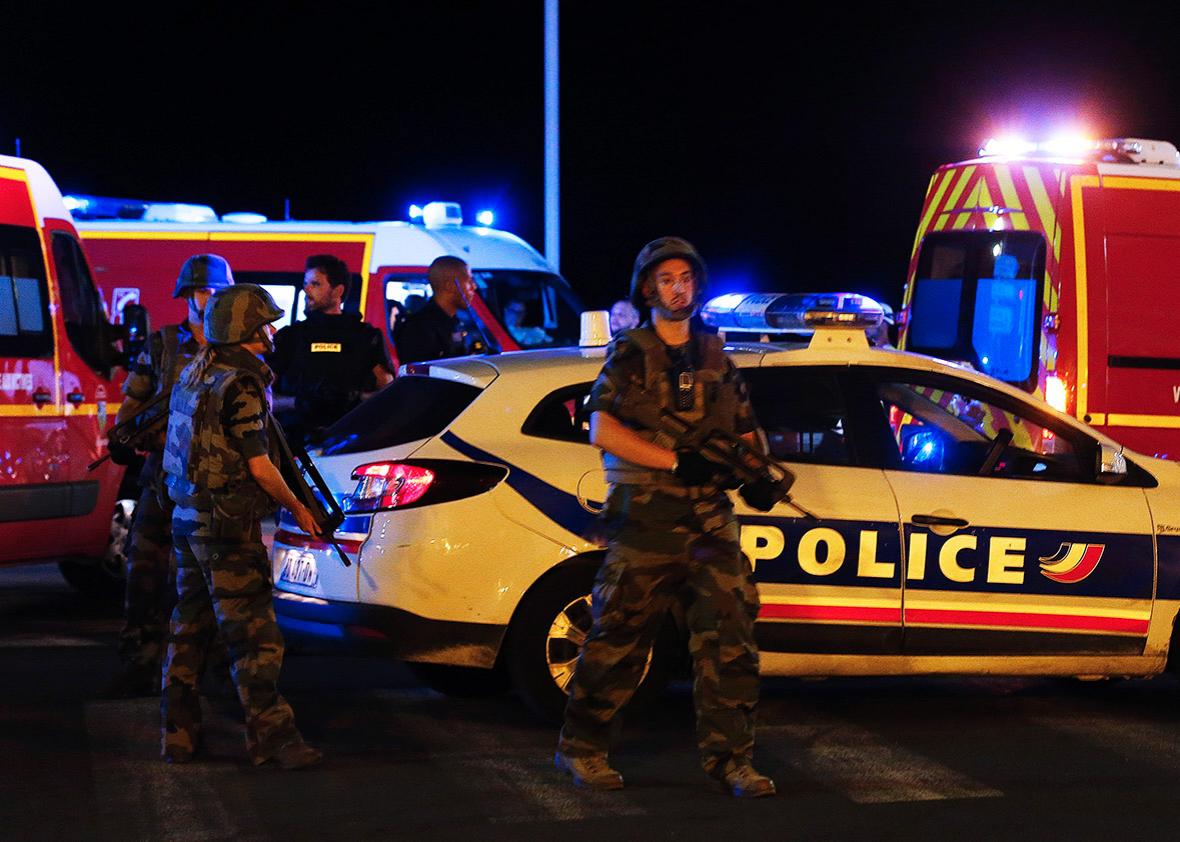On Thursday, disaster struck France again. An assailant drove a truck through a crowd of Bastille Day revelers in Nice, killing at least 84 people and injuring hundreds of others. We know relatively little about the attacker, but authorities on both sides of the Atlantic are treating this as a terrorist attack.
As are politicians. Here in the United States, both Hillary Clinton and Donald Trump have made statements on the attack in Nice. And as was true with the killings in Dallas or the shooting in Orlando, their responses go to the core of their political personas. Which is another way of saying the obvious: Clinton is a traditional politician in every way you can imagine. Trump is a train wreck.
Let’s start with Clinton. The presumptive Democratic nominee went to CNN to talk terrorism with Anderson Cooper, and she stayed very much on message. When asked whether the U.S. was at war with terrorist groups, she disavowed a ground intervention in Syria and other ISIS-held territories and focused on more conventional counter-terrorism measures. “I would be very focused on the intelligence surge,” she said. “I would be very focused on working with our partners and allies and intensify our efforts against the ideologues that peddle radical jihadism online.”
When asked about the term radical Islam, she followed her line from previous interviews on the topic. “We’re at war against radical jihadists who use Islam to recruit and radicalize others in order to pursue their evil agenda,” Clinton said. “It’s not so important what we call these people as what we do about them, and I think back to our success in getting Bin Laden. It was important that we built the case, we got the information, and the president ordered the raid.”
And on the question of refugees to the United States, Clinton pushed back on the notion that terrorists could infiltrate the U.S. by posing as such. “I would not short-circuit the vetting process,” Clinton said. “If we are talking about women, children, orphans who are fleeing horrific violence, that’s a different category than young men or people who have some record that could be ferreted out as some concern.”
Again, a typical response from a mainstream politician.
Then there was Trump.
As soon as news broke of the attack, Trump was out with a tweet: “Another horrific attack, this time in Nice, France. Many dead and injured. When will we learn? It’s only getting worse.” As Trump tweets go, it’s vague. But it’s a clear reference to the real estate mogul’s constant warnings about the threat from “radical Islam.” (This, despite the lack of information on the attacker and his motives.)
Shortly after this tweet, Trump made an announcement. He would postpone his vice presidential announcement, in honor of the victims. He then took to Fox News to speculate on this announcement (early reports said it was Indiana Gov. Mike Pence), while offering commentary and observations on the attack in Nice. When asked about this behavior the next morning, Trump adviser Paul Manafort explained that the presidential nominee “emotionally reacted to [the attack], it really bothered him, and he felt the pain, just felt it was not right to do something self-serving and political the day after.”
Hours later, Trump announced his vice presidential choice, as if he had never said he would be doing otherwise. And hours after that, several reporters revealed something remarkable: Around midnight on Friday, Trump was asking aides if he could back out of that vice presidential choice and shift gears.
It’s rare for a running mate to change the shape of a presidential race, but it’s still a vital decision. The process of choosing a vice presidential nominee, as much as the person himself, tells us a great deal about the presidential candidate and how he would govern. That Trump would try to go back on his choice—at the moment that it’s too late—doesn’t inspire confidence about his ability to govern and undermines his carefully crafted message of strength and resolve.
All of this is before we get to the nuts-and-bolts of the vice presidential rollout. As rumored and reported, Trump chose Pence. But there wasn’t a plan for the announcement. As Politico’s Shane Goldmacher explained on Twitter, Team Trump did little to prepare for Friday’s public unveiling. There was no press release, no note on the website, no new domain for the ticket, no indication—anywhere—that Pence was actually involved in the Trump campaign. Nor was there pushback to Democratic attacks on Pence, which came fast and furious.
You can look at the past 24 hours as a test for Trump. How would he make one of the biggest decisions of his campaign? How would he react in the event of a crisis? The answer is simple. Poorly.
